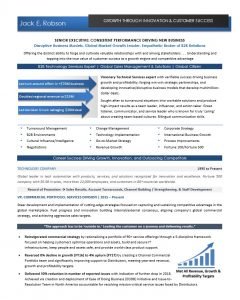Strong Foundations of an Executive Resume
If you’re considering an executive career change, you’ve probably asked yourself if you should write your resume or find an executive resume writer to create the resume/CV for you. Most everyone has a basic understanding of how to write a resume, but a basic understanding won’t get you far in today’s competitive job market.
Here are some tremendous executive resume writing tips and best practices that will help the DIY executive improve their resume.
The Foundation of Every Well-Written Senior-Level Resume –> It Isn’t About You
It is vital you shift your focus from what you are seeking in your next role to the value you bring your next employer; how your executive experience, business skills, and corporate achievements align with the executive job opening and the goals of your future employer.
Focus your writing on how your executive leadership qualifications, problem-solving acumen (financial, human capital, profit margin, global expansion), and industry knowledge have made a difference, and you will land more six-figure interviews.
Focus on Relevant Experience and Trim the Fat!
As an executive, you have a wide breadth of experience; however, that doesn’t mean you should include all of your experiences on your resume. The key to executive job search success is getting laser-focused on the position you seek and then omitting skills and experiences that aren’t aligned. Only include information most relevant to your target role (CEO, COO, CIO, CFO, CTO, CMO, etc.), thus strengthening your executive candidacy.
Provide the Reader with Interesting Context
A bulleted list of achievements without context will fall flat. For your executive resume to resonate with a hiring authority or executive recruiter, you need to provide value-driven branding statements that succinctly communicate your ability to not only deliver on mandates but also produce results in the face of unique challenges and business shifts.
Yes, your senior executive knowledge and expertise are key components, but hiring managers want to know more. How have you strengthened the organization, improved the organizational culture, and ultimately made a difference in the company’s business agenda during critical company phases? Summarize an explanation of the challenges you faced and the actions you took. Become more than a good fit for the position you are currently seeking–become the best!

Make it Look Good!
An attractive resume is critical to capturing attention over other executive candidates. Use text enhancements (bolding, italics, or color) to help draw the eye across the page and to pertinent information. Remove all unnecessary details, adjectives, and generic words and phrases (e.g., “highly motivated, results-oriented, accomplished senior executive”).
Be Consistent
For your executive resume to be memorable, you have to maintain alignment between your personal brand and your target employer’s needs. Before you begin writing, you need to identify your target audience and the value you bring to an organization. Once you begin writing, you need to stay focused on delivering a brand-centric message.
Prove It
You do this by showcasing your unique skills, experiences, and accomplishments underscored by key performance indicators.
Every word should add value by proving you can dissolve barriers to business growth, meet objectives, and affect change. Words tell the story, but they must be the right words and in the right place.